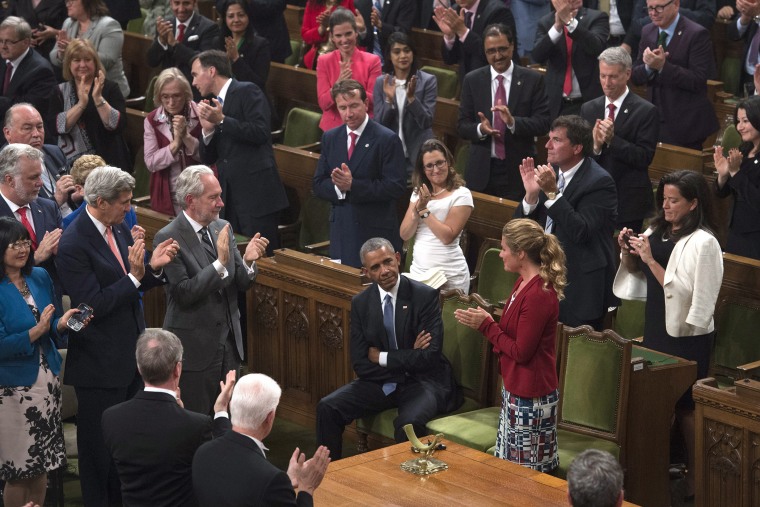If you missed President Obama's
address to the Canadian Parliament yesterday, it was a rather extraordinary event in which the American leader received a rapturous welcome. Given the warmth of the reception, it became quite easy to believe that if Obama decided to seek public office north of the border, he'd win in a landslide.
It was Obama's third round of public remarks Wednesday during a series of talks dubbed "The Three Amigos Summit" by Canadian media, and as he concluded, the building erupted in a chant unlikely to be heard south of the border: "Four more years! Four more years!" Obama shook his head, waved and sat down, a wide grin across his face.
It was heartening, to be sure, to see an American president receive such an outpouring of support in a foreign country. For all the Republican rhetoric about the lack of respect Obama enjoys on the international stage, even among our allies, yesterday was a reminder that complaints from the president's detractors couldn't be more wrong.
But it also got me thinking about whether those cheering the president were bringing attention to an under-appreciated argument.
Back in March, Vox's Matt Yglesias
raised a provocative point: President Obama is probably the best available candidate, even now, and if Americans want to vote for him again, we should have the opportunity to do so.
"The 22nd Amendment, ratified in 1951, prohibits presidents from serving more than two terms," Matt wrote. "But though it can't be repealed in time for the 2016 election, term limits clearly have to go. We should return to the democratic practice that served our country well for 150 years: Let the parties nominate whom they like, and let the voters choose their favorite."
Americans aren't accustomed to thinking this way, because we know, as a constitutional matter, that presidents are only allowed to serve two terms. But there's a case to be made that this limit serves no legitimate purpose: if a president enjoys broad support and the public wants to vote for him or her, why should there be an arbitrary mechanism in place that blocks voters' choices?
Indeed, Rachel noted a new PPP poll last night that found, in a hypothetical match-up with Donald Trump, Obama would win easily. Why shouldn't Americans have the ability to cast that vote if we want to? Why artificially block voters' choices, disqualifying a candidate simply because he or she has already done the job effectively?
Remember, there's nothing partisan about this. In November 1987, then-President Reagan said he intended to "
start a movement" to repeal the constitutional amendment establishing presidential term limits.
Six months later,
Reagan spoke at Moscow State University in Russia and was asked about whether he wishes he could "stay for another term." Reagan began by talking about Congress seeking "revenge against Franklin Delano Roosevelt" when lawmakers changed the Constitution, which Reagan apparently saw as a mistake. The Republican president added:
"When I get out of office -- I can't do this while I'm in office, because it will look as I'm selfishly doing it for myself -- when I get out of office, I'm going to travel around what I call the mashed-potato circuit -- that is the after-dinner speaking and the speaking to luncheon groups and so forth -- I'm going to travel around and try to convince the people of our country that they should wipe out that amendment to the Constitution because it was an interference with the democratic rights of the people. The people should be allowed to vote for who they wanted to vote for, for as many times as they want to vote for him; and that it is they who are being denied a right."
This is largely a thought experiment, since there's no apparent political appetite for changing the U.S. Constitution to eliminate presidential term limits. But hearing Canadian officials yesterday shout "Four more years!" with such enthusiasm served as a reminder: maybe they have a point.
